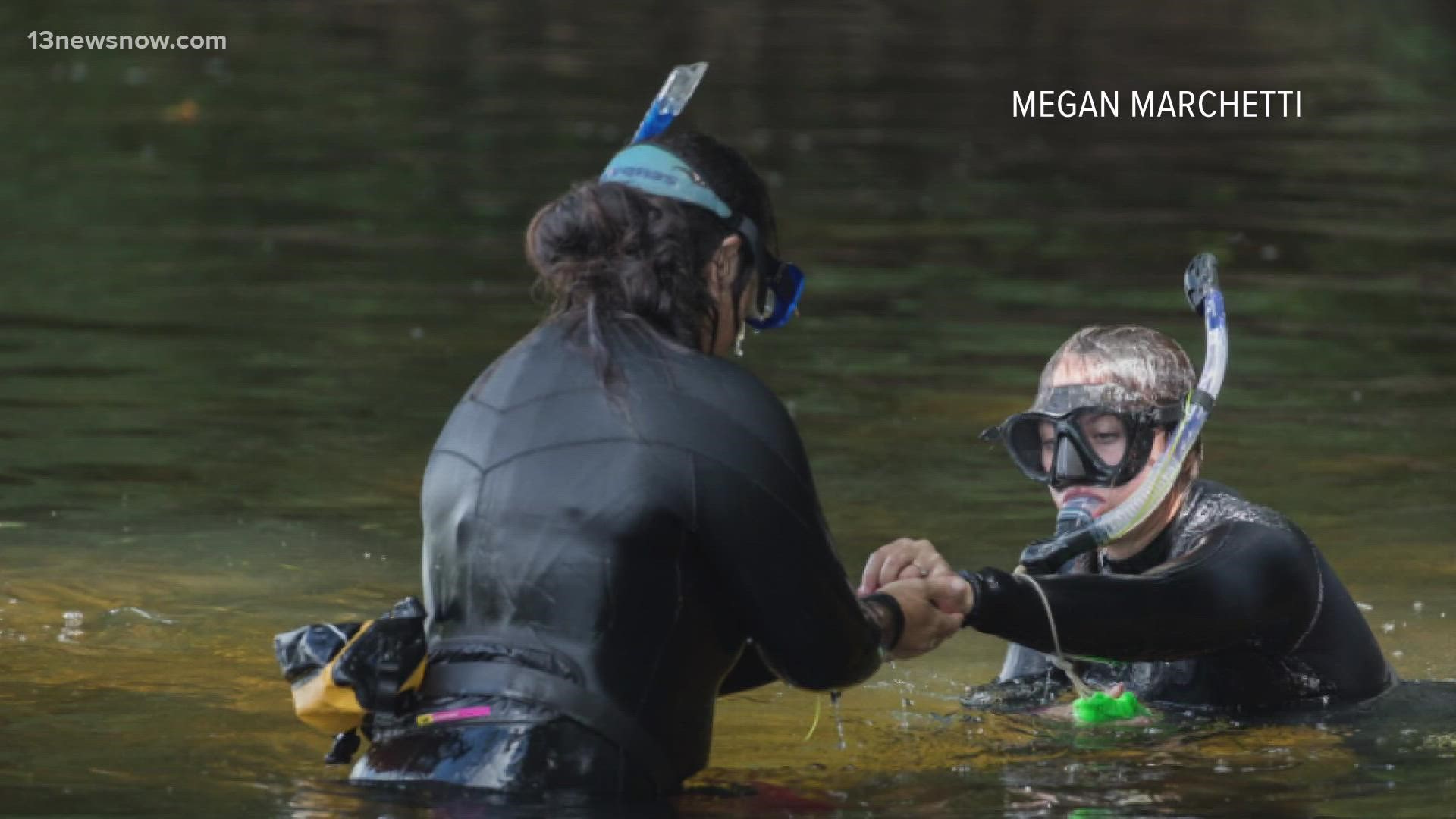NORFOLK, Va. — Author's note: The video above is on file from a separate story that aired on September 7, 2022.
Several states are collectively off track to meet the 2025 deadline to help clean up the Chesapeake Bay, according to a new report from the Chesapeake Bay Foundation (CBF).
The CBF's 2022 State of the Blueprint report found that Maryland, Pennsylvania and Virginia are struggling to reduce pollution from urban and suburban runoff, agriculture and septic sources.
Under the Chesapeake Clean Water Blueprint, six states — Maryland, Virginia, Pennsylvania, Delaware, New York and West Virginia — and Washington D.C. have to meet pollution limits for nitrogen, phosphorus and sediment.
The goal is to restore water quality in the bay, and the rivers and streams that flow into it.
Excessive nitrogen and phosphorus are bad for water quality because they feed algal blooms, which block sunlight to underwater grasses and suck up life-supporting oxygen, according to the CBF.
Blooms result in "dead zones" that can stress and kill fish and shellfish, as well as the growth of parasites and toxic algae that can make people and animals sick.
Since the blueprint was established in 2010, states have made progress, mostly by reducing pollution from wastewater treatment plants. Because of this, Maryland and Virginia individually could still meet the 2025 deadline, but Pennsylvania is far behind, the CBF said.
"Pennsylvania — given its significantly larger agricultural footprint in the watershed and past under investment in conservation programs — is especially far off track," the CBF wrote on its website. "These issues raise serious concerns about the ability to improve and sustain water quality over the long term."
Even if Maryland and Virginia meet the deadline, pollution reduction efforts have to be sustained in the long run for the Chesapeake Bay's water to be clean.
Virginia on track to meet Chesapeake Bay goals, long-term problems persist
Virginia is considered on track to meet its overall 2025 goals, but the CBF said the state's path isn't sustainable in the long run.
The report praised Virginia's efforts to reduce wastewater pollution, such as a 2021 state law addressing wastewater treatment, proposed regulations to prevent algal blooms in the James River and investments in wastewater treatment plant upgrades.
That said, the CBF said the state needs to address pollution coming from other sources.
"About 90 percent of Virginia’s remaining pollution reductions must come from agriculture, and population growth and climate change are leading to more polluted runoff from developed areas,” CBF Virginia Executive Director Peggy Sanner wrote in a news release.
She added: “Thankfully, legislators recently accelerated investments in programs that reduce pollution from stormwater, agriculture, and wastewater. Maintaining strong state support for these programs, while targeting funds to the most effective practices, is the only way to ensure healthy rivers and streams in the future."
The 2022-23 state budget Virginia Gov. Glenn Youngkin signed in June had significant investments in Chesapeake Bay cleanup efforts, which the CBF praised as "historic."
RELATED: More work needed to clean up Chesapeake Bay, but progress has been made. How can Virginia help?
The budget includes support for farmers who adopt conservation practices, grants for local governments to reduce polluted runoff, modernization of sewer systems in three cities and more.
Leaders to talk Chesapeake Bay cleanup efforts
The Chesapeake Executive Council (EC), which oversees policies to address the restoration and protection of the Chesapeake Bay, will meet on Tuesday, Oct. 11.
The council consists of the governors of the six watershed states, the mayor of D.C., the Chesapeake Bay Commission chair and the U.S. Environmental Protection Agency administrator.
Ahead of the meeting, the CBF is pushing for the council to take action.
"Critical leadership is needed and requires the EC to acknowledge that the states are not on track to meet the 2025 commitments, recommit to the partnership and the Bay restoration goals, and commit to developing a new plan with a specific timeline and accountability to permanently protect the Bay," the CBF wrote.
In a statement to 13News Now, Youngkin's office said Virginia may not reach the 2025 deadline, but the governor is committed to Chesapeake Bay cleanup efforts.
“Governor Youngkin's administration is committed to addressing Virginia's ongoing environmental, energy, and natural resources challenges, including taking necessary actions to protect the Chesapeake Bay," Youngkin spokesperson Macaulay Porter wrote.
"After taking office, it was clear that Virginia was not on track to meet our 2025 commitments, but the Administration also discovered there was not a realistic plan in place to achieve significant progress. The Governor is now moving aggressively to determine how to meet our obligations to the Bay so that Virginians can continue to enjoy this unique resource.”

